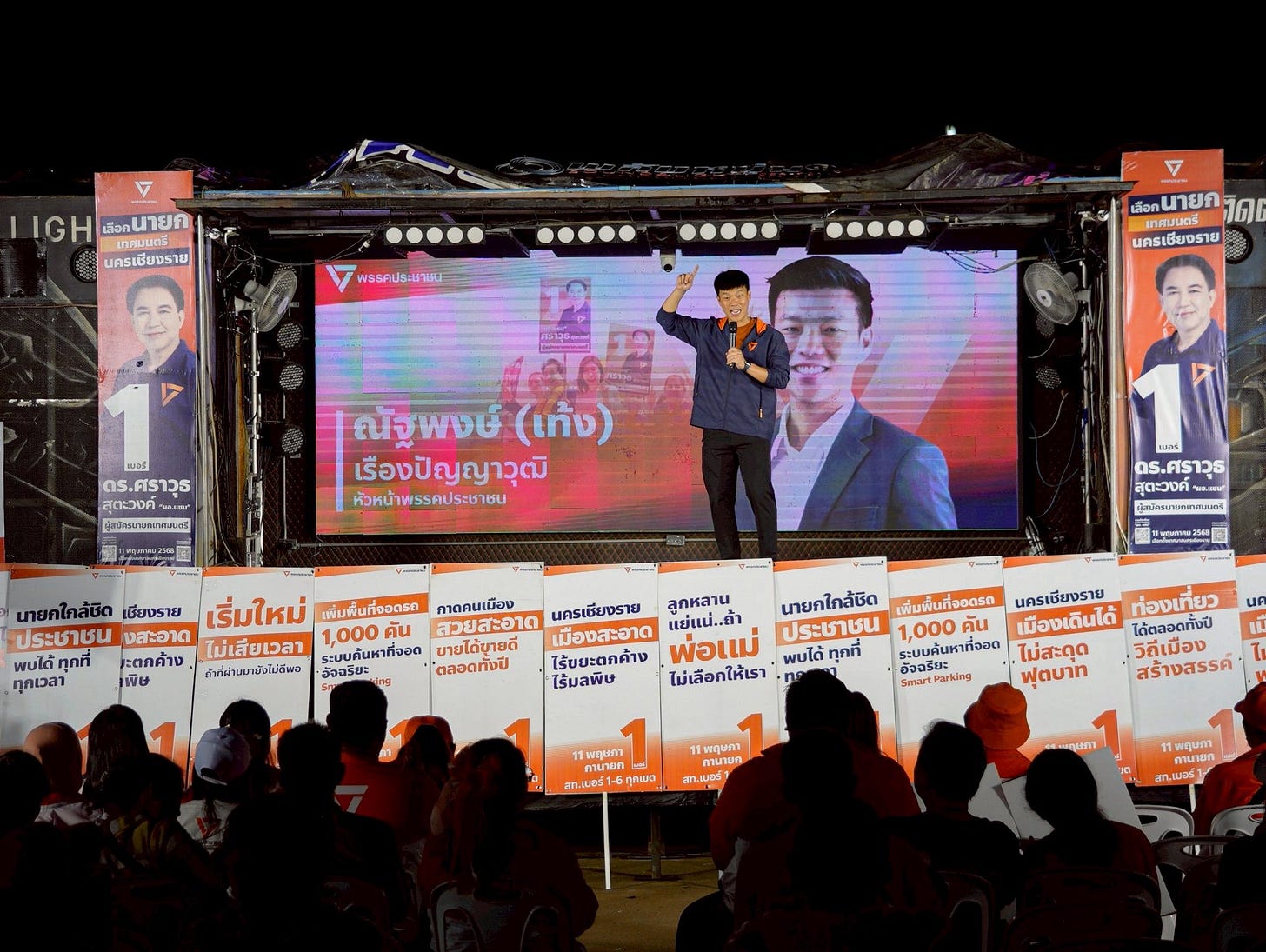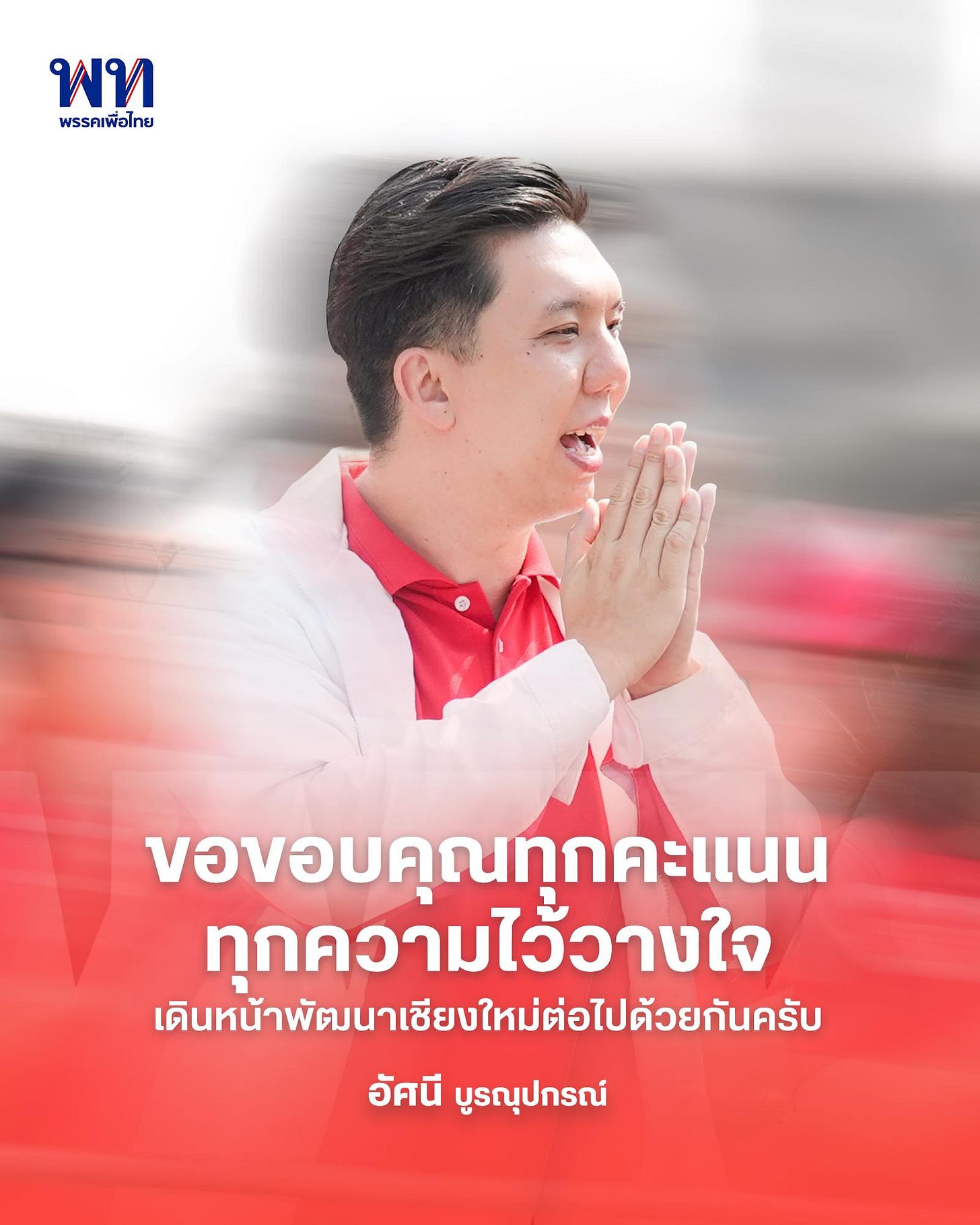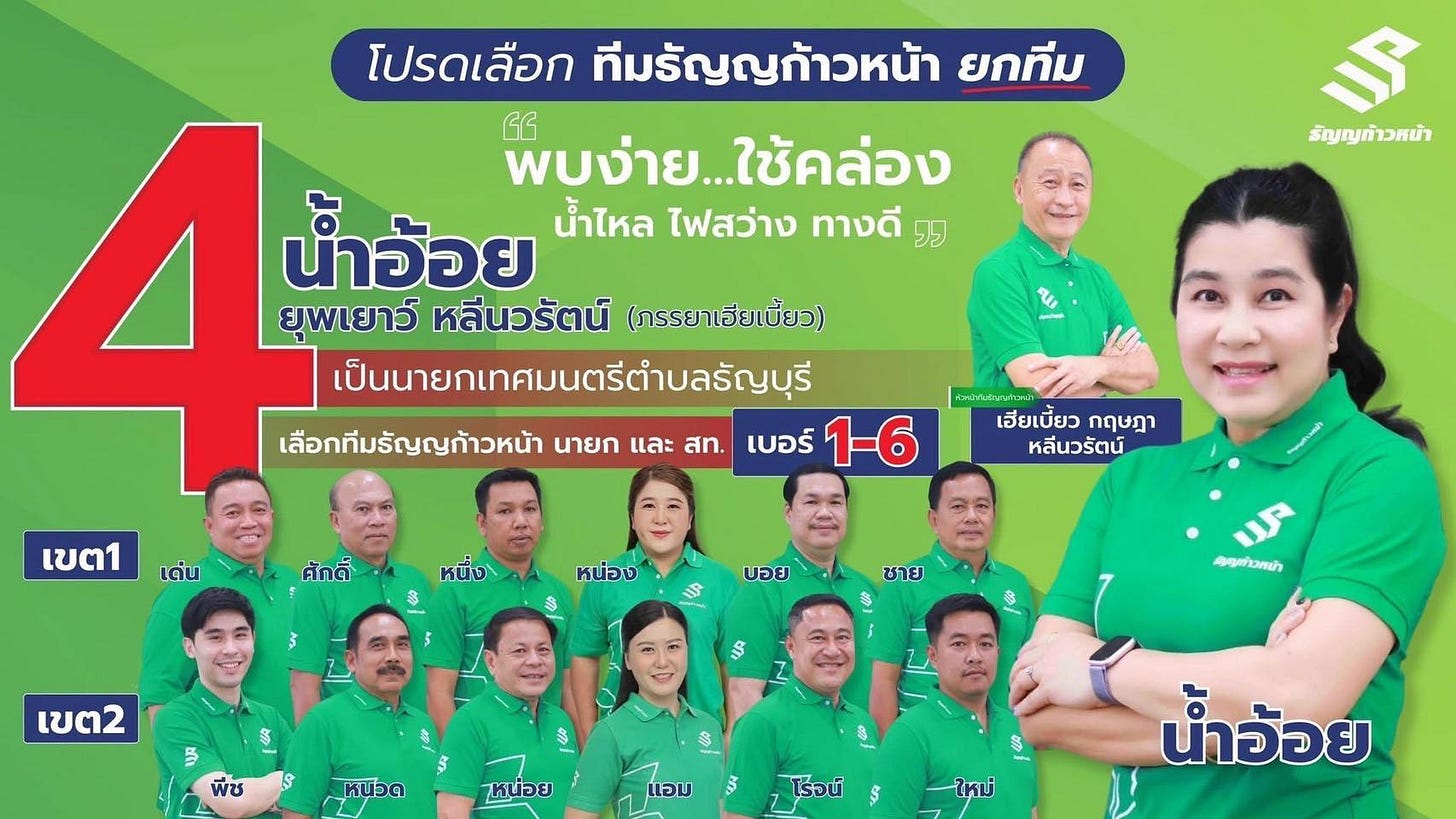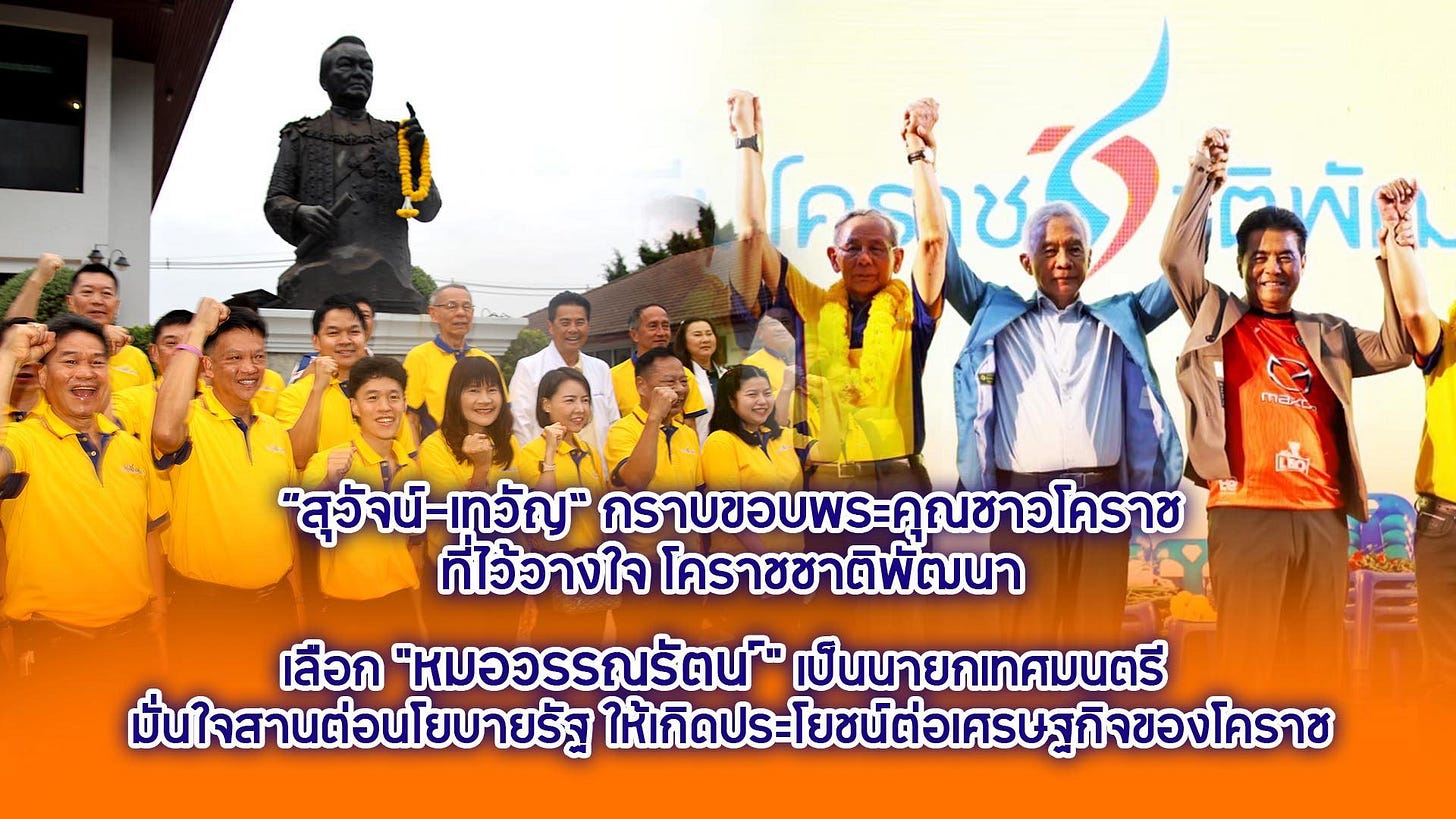Highlights from the 2025 Thai Municipal Elections
Minor gains for the People's Party, Thaksin defends his home base, and more

Thailand held municipal elections across the nation on Sunday, May 11th. Three types of municipalities exist in Thailand: the thessaban nakhon (for municipalities with over 50,000 people), thessaban muang (for municipalities with over 10,000 people) and thessaban tambon (no minimum population prescribed). Elections were held for mayors (nayok thessamontri) and municipal councillors (sapha thessaban) in all 76 provinces, with the special administrative region of Bangkok exempted.
Earlier this year, I wrote a piece describing some of the major takeaways of the Provincial Administrative Organization (PAO) elections, along with some analysis on the increasing importance of party branding in the local elections. Some of these trends are replicated here: victories for incumbents from the local dynasties, for one, and the clear use of People’s Party branding by their candidates versus the more ambiguous strategies adopted by local dynasties, so I won’t repeat those observations here.
Instead, let’s dive into some of the highlights — some very colorful — of these municipal elections.
The People’s Party makes minor gains

The headlines were once again dominated by how the People’s Party candidates were mostly defeated; the Bangkok Post called it a “big blow” and notes that all 15 PP candidates running in thessaban nakhon municipalities lost their races. I do think, however, that this obscures the extent to which the PP has made gains since the Progressive Movement’s dismal showing in 2021. Yes, the local dynasties were still largely dominant. And the PP actually won three fewer thessaban tambon mayoralties (from 12 to 9) this year than in 2021. But the PP did win five mayoralties in the thessaban muang (out of 26 contested).
What does this mean? It shows that the PP still has its work cut out in figuring out how to compete effectively in local elections, of course, a point that analysts have been making for the past four years. But as the media outlet The People noted, this year’s election results does demonstrate the PP has moved from winning solely in very rural constituencies to gaining more support in more populous and more urban areas. “Although in many areas support for the PP has grown, it was still not enough to overcome the baan yai [“big houses”] that have dominated hearts and minds for so long,” The People writes. Although the PP still has proven unable to out-muscle any of the local dynasties in the most populous urban centers, it has made clear inroads elsewhere.
All in all, the election results were probably still disappointing for the PP — but not so much so that it makes a complete mockery out of PP leader Nattapong Rueangpanyawut’s post-election press conference comment that the PP’s performance was “relatively satisfactory.” Once again, the onus will now be on the PP to prove that it can govern effectively in the new areas it has won.
Thaksin has a win in his home base

Chiang Mai is former prime minister Thaksin Shinawatra’s home province, and he once again staked his reputation on winning this home base for his party’s candidates. Thaksin campaigned personally for Asanee Buranupakorn, who ran officially under the Pheu Thai banner. (Asanee is the incumbent and the third member of his clan to hold Chiang Mai’s thessaban nakhon mayoralty). Asanee managed to dispatch the PP challenger with ease. While I don’t think there are too many implications for the national elections from this race, at the very least Thaksin can say that his electoral appeal is still potent in Pheu Thai’s heartlands.
A scandal-ridden candidate rides to victory

The thessaban tambon municipality of Thanyaburi in Pathum Thani attracted outsized attention in this election cycle. That was because Smitthiphat Leenawara, a councillor candidate, is facing several charges. As the Bangkok Post explains: “On April 16, Mr Smitthiphat, in his brand new BMW car, sideswiped the pickup truck of Prachak Duangyai, 65, and his wife Somsri, 64. Both sustained injuries in the crash, with Mr Prachak in intensive care.” Yet Smittiphat won his election for councillor, while his mother won the mayoralty. Some important context: Smitthiphat’s father, known informally as Nayok Biew, is the mayor, while Smitthiphat’s brother is a Pheu Thai MP. Last year, both Prime Minister Paetongtarn Shinawatra and Thaksin attended Smitthiphat’s ordination ceremony, demonstrating the political influence of the family.
The Thai newspaper Khaosod commented: “This has led to criticism about how, no matter how scandalous the news of Look Peach [Smitthiphat’s nickname] was, no matter how harsh the commentary on social media, this did not change the result of the thessaban election. This is because local elections are about old ties and the livelihoods of local people. Therefore, the Thanyaburi election results show that the barami [loosely translated as “charisma” or “prestige”] of Nayok Biew [the incumbent mayor and Smitthiphat’s father] still matters.”
The Chart Pattana Party still lives

In the grand scheme of things, the victory of Wannarat Channukul in Nakhon Ratchasima’s thessaban nakhon mayoral election does not have much significance beyond the province. But I highlight this election because it proved to be a successful last stand for a once-mighty political party: Chart Pattana. Founded by former prime minister Chatichai Choonhavan in the 1990s, the party used to be a nationwide electoral force but has since been steadily reduced. Party grandee Suwat Liptapallop still wields some influence, judging by the frequency in which he appears in photos with Thaksin Shinawatra and other coalition leaders, but losing its last MP in its home base of Nakhon Ratchasima in 2023 was a major embarrassment. Thaksin even mentioned at one point that Suwat might be moving to Pheu Thai, which would imply that the party would be dissolved.
Chart Pattana did hold the thessaban nakhon mayoralty, although the incumbent had to resign due to ill health. Chart Pattana chose to play what Suwat called the party’s “last card,” having its party-list MP former energy minister Wannarat Channukul resign his House seat to run. Wannarat ended up defeating the PP candidate with ease, winning his seat with a margin of thousand of votes. All councillor candidates from Chart Pattana also won. Even as the party is a shell of its former self nationally, it could still win when it mattered most locally.
The polling place with no votes
A minor media sensation: candidates in the thessaban tambon of Baan Wieng in Phrae province ended up receiving zero votes from one polling station. Out of 747 eligible voters, only 10 showed up to vote, and all chose the “I do not wish to vote for any candidate” option. Reports said that voters argued that the local government has done nothing to improve their lives. “Having a thessaban is like not having one,” voters apparently said. However small, it is a sad state of political disillusionment.


Thank you for your perspectives on these elections which are so poorly reported by the available English language media (and, quite possibly, by the Thai media too)